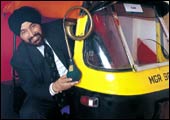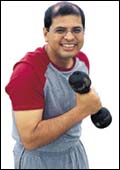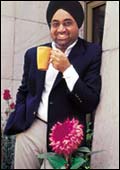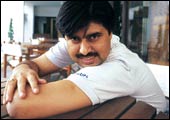|
|
| Clockwise from top: Star India COO Sameer Nair,
Grey's Nirvik Singh, and ICICI Bank's Nachiket Mor |
Say
hello to the stars, all 25 of them. They are young-the oldest is
42. They wield power: some head companies, others, divisions or
functions, and still others are far too young to head anything at
all. But each boasts that mystic, intangible thingamajig that makes
it evident to all concerned that they're headed for greater things.
We didn't pick this list out of thin air. There was a method (See
page 48 for Methodology) to it. Still, the list remains a subjective
one, and its exactness is limited by the collective wisdom of the
expert panel that drafted the shortlist.
Companies share a love-hate relationship with
their stars. They love the results stars produce: no target is unachievable,
no task too tall. They hate managing star egos. And they hate the
effect stars have on other people in the organisation. That, and
the fear that others may poach their best make most companies reluctant
to agree to a public display of their stars. Surprisingly, none
of the companies to which the power-25 belong, barring one, had
problems parading their stars. The one, HLL, had two people in the
original list of 25, the head of the company's foods business Gunender
Kapoor, and the head of its fabric wash business, Nitin Paranjpayee.
While scotching BT's requests to interview the two executives, a
HLL spokesperson said, "It is not the practice for HLL, or
its managers to speak about themselves."
Although the listing is a diverse one, there
are some common threads running through it. None of these will help
you become a star yourself, but they could help-especially if you
are in possession of every other quality required to become one.
If you are the management-type turn to page 48 for a smattering
of these success-secrets. If not, and vicarious pleasure is all
you are in search of, read on...
 Jaspal
Bindra Jaspal
Bindra
42, CEO, India Region, Standard Chartered
Banker #1
The soft-spoken Bindra has wielded a big stick
to effect a tricky integration with ANZ's Indian operations.
There's a new screensaver
on jaspal bindra's desktop. It is the new Standard Chartered Bank
logo and it has ousted Marilyn Monroe and Miss-World-turned-actress
Aishwarya Rai from their electronic abode-the CEO is a film buff.
A chartered accountant, and a MBA, Bindra signed up with Standard
Chartered Bank in 1998. Two years later Standard Chartered acquired
all Grindlays operations in the Middle East and South Asia from
ANZ Banking Group and Bindra embarked on the most tumultuous ride
of his career. ''People,'' is Bindra's one-word response to a query
on what he considered the biggest challenge posed by the merger.
A Mumbai-based hr consultant points out that the bank has witnessed
the exit of a considerable amount of talent in the past two years.
Still, that hasn't impacted its performance: With Rs 29,000 crore
in assets, Standard Chartered is the largest foreign bank in India
and contributes 11 per cent to the balance sheet of the parent,
up from 1 per cent in 1999. And in 2001-02, the Indian operation
doubled its operating profit. Business and political-savvy, Bindra
has enough of, courtesy stints in UBs as head of structured finance,
capital markets, and debt, and in Bank of America. Surprise, surprise,
the ace banker has also ended up being a not-so-bad people manager.
''He is known to be failure-tolerant and allows his team to make
mistakes,'' says Sonal Agrawal, Director, Accord, a head-hunting
firm. The next challenge, in Bindra's own assessment is to stay
number 1: ''The good news is we are number one; the bad news is
we are number one.'' Maybe some of that failure-tolerance would
help.
-Roshni Jayakar
 Anil
Chawla Anil
Chawla
37, CEO, Commercial Finance, GE Capital
Hard-nosed Numbers Man
Even in Type-A rich GE, Chawla's ability to
meet his targets is legendary
Since 1996, when
chartered accountant Chawla signed on, GE Capital's commercial finance
arm has had no non-performing assets. And the business has seen
its asset-base grow from $507 million (Rs 2,474 crore) in 1999 to
$1.2 billion (Rs 5,855 crore) today. Coincidence? Maybe not. When
Chawla, whose CV shows stints in Citibank, London, ILFs, and Amex,
came to GE Capital, the year-old firm was borrowing money at interest
rates that were way too high, and had a portfolio composed mainly
of not-so-high-quality debt. Chawla started working on improving
the quality of the portfolio. Within a year, he was heading the
business' northern region ops. Then came bigger deals-(GE financed
the $150 million (Rs 732 crore) Hutch buyout of Essar's Delhi operations.
''He is one of the most highly rated managers in the GE system,''
says R. Suresh, CEO of hr consulting firm Stanton Chase. A beneficiary
of his own CEO's efforts to delegate and empower, Chawla is now
working on building leaders who can take over from him, and dreaming
of a new assignment where he can build a business in a completely
different environment. At GE, he'll surely not have to wait long
for that.
-Abha Bakaya
 Ranjan
Chak Ranjan
Chak
41, Vice-President (Product Services), Asia
Pacific, Oracle
Software Superstar
Oracle's India Development Centre has trebled
in size over the past 18 months: blame it on Chak.
On a typical day,
I get up in the morning and board a flight to somewhere," laughs
Ranjan Chak. The prematurely graying Hyderabad-based six footer
has been Oracle's man in India for the past nine years. From a development
resource, Oracle India has become a strategic partner to the parent's
product divisions. Chak has played a big role in this. The man who
holds a honours degree in applied mathematics from Harvard U, set
up both the Bangalore and the Hyderabad centres. Today, Oracle IDC
(India Development Centre) employs 2,200 and contributes to Oracle's
global internet strategy. And for those interested in tech-minutiae,
Oracle IDC's Oracle Database Appliance was named Product of the
Year for 1999, by Information Week magazine. Chak's newest mandate
is to provide Oracle's customers worldwide with electronic support
and remote management services out of Melbourne, Bangalore, and
Hyderabad. We see many more red-eye flights in Mr Chak's life.
-E. Kumar Sharma
 Amit
Chandra Amit
Chandra
34, Executive Vice President, DSP Merrill
Lynch
Rainmaker In Waiting
He's young, but the foremost among India's
next generation of I-bankers
India's investment
banking business is dominated by the big three rainmakers, Nimesh
Kampani, Hemendra Kothari, and Uday Kotak. Amit Chandra, an electronics
engineer from VJTI, Mumbai, and a MBA from Boston College is part
of the new breed of India's I-bankers. He's worked in DSPML's international
corporate finance group-his first assignment after he joined the
firm from Twentieth Century Finance in 1994-and is now responsible
for investment banking, mergers and acquisition, and strategy and
planning. Over the last eight years, he has managed some of DSPML's
key clients such as ICICI and the Aditya Birla group, and originated
and completed some of India's largest transactions such as the ICICI-ICICI
Bank merger, Indian Rayon's acquisition of Madura Garments, and
Sify's acquisition of Indiaworld. Perish any thoughts of Chandra
as a Rolodex-pumping man about town. Lunch is usually a desk-bound
affair-a brown bag from home-and the evening (Chandra is out by
half past six most days), or most part of it, is spent in a gym.
"That's helped me lose weight," says Chandra. Gymming
and all that rainmaking.
-Roshni Jayakar
 Ravi
Deol Ravi
Deol
39, MD, Barista Coffee Company
Coffee! Coffee! Coffee!
How many people can claim to have created a
retail-category? Deol can.
In 2000, a head-hunter
got a reluctant Ravi Deol, then the 37-year-old national distribution
manager for Coca-Cola to meet with Amit Judge of the Turner Morrison
group. Judge wanted to do a Starbucks in India and he wanted Deol
to head it. Deol liked what he heard; today, two years later, Barista
is one of the largest retailers of speciality coffees in South Asia
(105 cafes, sales of Rs 65 crore) and the FMs alum with sales experience
spanning three companies and as many industries- CibaGeigy (pharmaceuticals),
Wipro (consumer products), and Coca-Cola (beverages)-has arrived.
Only, Deol doesn't think so. "You learn everyday," he
shrugs. "And you change everyday."
Abha Bakaya
 Pradeep
Gidwani Pradeep
Gidwani
38, Managing Director, Foster's India
Old Head, Young Shoulders
Thanks to Gidwani, Foster's sells a pint of
beer every second in India.
Meet madman Gidwani,
the man who turned conventional wisdom on its head, first when he
recruited women managers to sell beer to five-star hotels and restaurants-he
believed they were poorly serviced-and then when he launched Foster's
in Mumbai during the monsoon. "If women can sell space and
hotel rooms, why not alcohol," argues the silver-maned Gidwani,
an alumnus of the Pune-based Symbiosis B-school. "The marketing
and relationship-building skills required are the same." The
Bombay-boy started his career as a management trainee in Brooke
Bond but liquor was his passion. Even today, he can be found hustling
up exotic cocktails for visitors to his Bandra home (Vodka and watermelon
juice and Whisky and pomegranate juice are two favourites) and reads
all he can about liquors. Passion and profession met when he joined
Herbertson's in 1991. Then it was on to United Distillers and lvmh,
before Foster's came calling. The unconventional tactics have helped:
Foster's India returned revenues of Rs 45 crore in 2001-02, not
bad for a four-year-old. Expect more of the unconventional from
the man who once spent a week piloting a hired boat through backwater
canals in France's Burgundy region. There's that liquor connection
again.
-Abir Pal
 Rajeev
Karwal Rajeev
Karwal
39, Senior Vice President, Consumer Electronics,
Philips India
The Celebrated Salesman
He helped Onida and LG create magic and his
own brand of it seems to be working for Philips.
It has been a
long strange trip for Karwal. The MBA from IMT Ghaziabad started
his career in 1984 working for Onida on a salary of Rs 1,500 a month.
By 1993, when he left to work for the Chellaram group in the Canary
Islands, Onida was one of the country's pre-eminent brands. Then
it was back to India, three high-profile years with LG (sales touched
Rs 1,000 crore in two years), and two, equally high-profile ones
thus far with Philips. "Listen to the market and you will never
fail," says the sales hound whose aggressive selling has made
a difference to most companies he has worked with. Philips India's
consumer durables arm ended the six-month period between January
and June 2002, with a net profit of Rs 24 crore; two years ago it
made losses of Rs 33 crore. Surely, that can't be luck?
-Abir Pal
1
2 3
|

